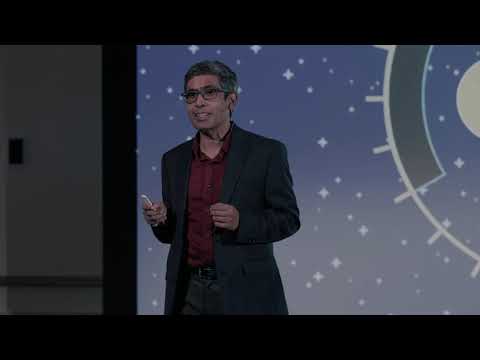Ayurveda in India
Yoga has enjoyed worldwide popularity for many years, but recently, Ayurveda has also gained significant attention for its focus on holistic wellness and its potential to address underlying health issues. Like Yoga, Ayurveda originated in India and focuses on the body’s health, while Yoga emphasizes mental well-being. Among many Ayurveda retreats available across the country, South India, particularly Kerala, is often regarded as its spiritual home.
Ayurveda extensively utilizes oils, herbs, and spices that flourish in South India’s lush environment, with its tropical climate offering an ideal setting for these treatments. Visitors can find Ayurveda retreats throughout the year in India, but I recommend focusing on South India from November to February for warmth, as North India can become quite chilly during this time. Monsoon season is also seen as an optimal time for Ayurveda treatments.
What is Ayurveda and Panchakarma?
Ayurveda is an ancient Indian healthcare system rooted in observations of nature. It aims to restore wellness and balance in the body through natural remedies. The cornerstone of Ayurvedic treatment is a series of processes called Panchakarma, typically spanning two to four weeks.
Panchakarma, which translates to “five actions,” refers to a collection of techniques designed to detoxify your system over several weeks. Each treatment is customized for the individual, helping to restore equilibrium and harmony. When the body is balanced, it becomes less susceptible to illness.
The Best Ayurveda Retreat in India
India offers a variety of Ayurveda treatment options, ranging from luxurious seaside resorts to clinical facilities. Whether you seek relaxation in a comfortable setting for a health reset or need serious medical attention, your choice will largely depend on your needs and budget. Luxury resorts are well-suited for those wanting a pampering experience, while clinics or hospitals may be better for more intense health issues.
I have visited numerous Ayurveda retreats in India since my first trip in 2005 to Shinshiva Ayurveda in Kerala. I’ve also explored Kairali in North Kerala and an Ayurveda homestay in Rishikesh, as well as resorts like Manaltheeram and Nirmaaya in Kerala, and those in Varkala, Goa, and Rishikesh.
One retreat I keep returning to is Hitayu Ayurveda Udupi, situated in the quaint town of Udupi, Karnataka. I’ve undergone Panchakarma there three times, and it’s significantly helped me with my ongoing thyroid issues, specifically hypothyroidism and Hashimoto’s Thyroiditis.
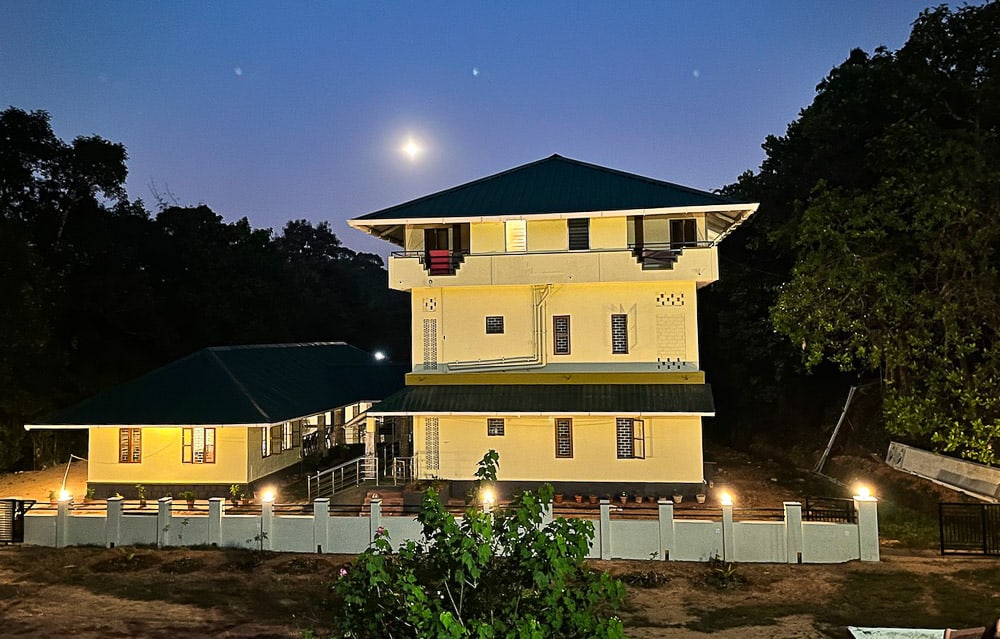
My Top 5 Reasons for Choosing Hitayu Ayurveda Udupi
1. The Benefits: I’ve experienced remarkable improvements following my treatments. After Panchakarma, my thyroid levels returned to the normal range, I lost over 4 kgs (9 lbs), regained my energy, and significantly improved my digestion.
2. The Doctor: Dr. Shivakumar is an exceptional individual—intelligent, caring, dedicated, and genuinely invested in healing.
3. The Clinic: Hitayu’s newly established clinic strikes a perfect balance as both a welcoming Ayurveda retreat and a reputable clinic that treats various medical conditions. The spacious rooms are very comfortable, the staff is warm and attentive, and the food is simple yet delicious.
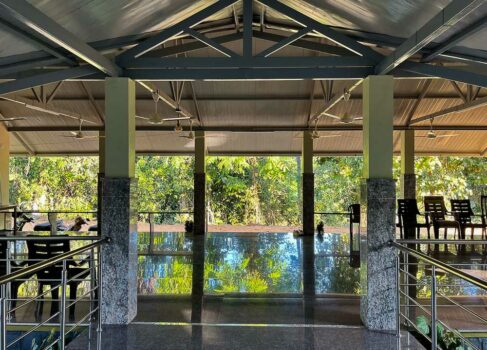
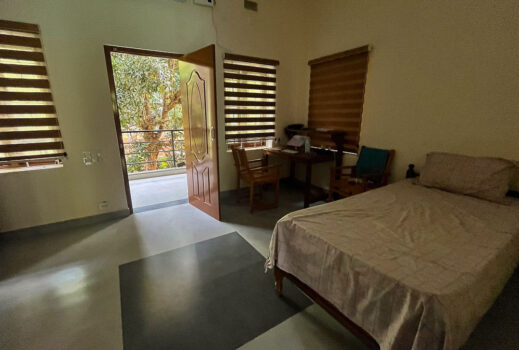
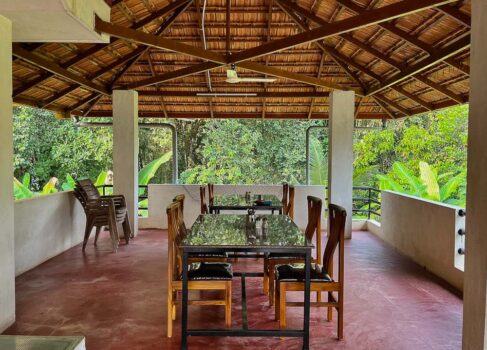
4. The Setting: The new Hitayu center lies about 20 kilometers outside of Udupi, Karnataka, surrounded by serene forests and rural landscapes. At night, I hear crickets and frogs, enjoy the starry sky, and awaken to fresh air infused with an earthy scent that is simply intoxicating.
5. Affordability: Unlike many luxury Ayurveda retreats in India that often receive attention, Hitayu offers more affordable options. Each program is unique and tailored to the individual’s needs. While exact pricing can vary, a one-week program—complete with non-AC accommodation, meals, and Ayurvedic treatments—averages around $500 USD for a single room. Sharing a room can reduce costs further, with additional expenses typically around $50 to $100 USD for medicines.
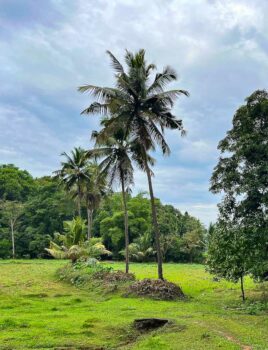
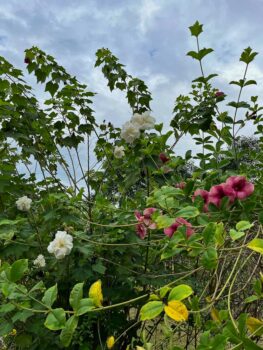
Regaining Your Natural Rhythms
A stay at Hitayu Ayurveda Udupi goes beyond treatments; it’s a chance to learn how to embrace a healthier lifestyle. Founder Dr. Shivakumar emphasizes education alongside healing, recognizing that a healthy lifestyle is essential for maintaining wellness.
One of the key principles he teaches is adhering to your natural rhythms, known as circadian rhythms. This concept resonated deeply with me.
I sought Panchakarma due to feeling unwell since the pandemic. During that time, I abandoned my usual healthy habits—overeating for comfort, reducing physical activity, and feeling stiff and stagnant.
Consequently, my thyroid health declined, and my digestion worsened, leading to various negative outcomes: gas, bloating, indigestion, fatigue, weight gain, brain fog, and low energy levels.
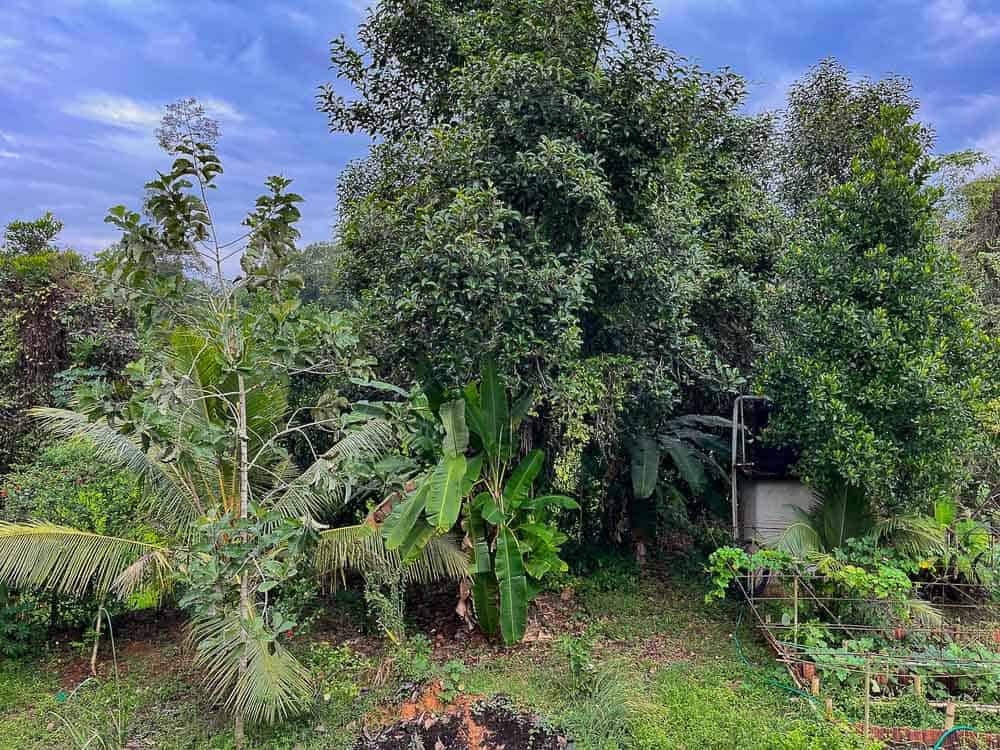
The Benefits of Panchakarma
I found the Ayurvedic treatment, Panchakarma, incredibly beneficial for rejuvenating my metabolism and revitalizing my digestion. I lost at least 4 kgs (9 lbs), regained my energy, and my appetite and digestion significantly improved.
Perhaps more importantly, thanks to in-depth discussions with the doctor, I gained insights into my previous discomfort and how to address it. When and how you eat can be just as crucial as what you eat—possibly even more so. It’s essential to generate “digestive fire” in your system to properly process your food and avoid accumulating toxins.
How does one achieve this? By eating only when genuinely hungry! The doctor promotes a program featuring two meals a day and a minimum 14-hour fasting period daily. This vital concept is explained in the video below.
How Optimizing Circadian Rhythms Can Increase Healthy Years
A TEDxBoston Talk with Satchin Panda.
According to Dr. Shivakumar, the healing process consists of three phases:
- Nutrition: Aahara
- Lifestyle: Vihara
- Medicine: Aashadha
However, the goal is to live with minimal reliance on medicine and treatments. As he states, “Maintaining health stems from the right combination of food and lifestyle choices. When, what, and how you eat are all essential (as well as the quantity). Everyone is unique; there is no one-size-fits-all solution.” In Ayurveda, treatments, diets, and lifestyle decisions are personalized to each patient.
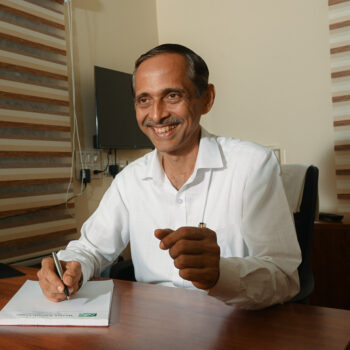
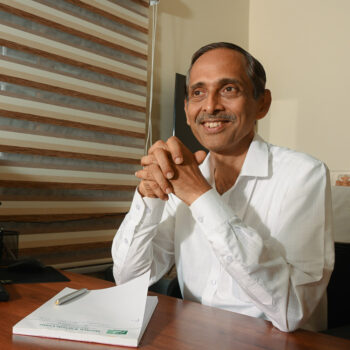
Interview with Dr. Shivakumar of Hitayu
Dr. M.B. Shivakumar, M.D. (Ayu), is an Ayurvedic physician with his graduation from the Government College of Indian Medicine, Mysore, and a postgraduate degree from Gujarat Ayurveda University, Jamnagar. He trained at Kottakkal Arya Vaidya Sala in 1994 and later served as a lecturer at S.D.M. Ayurveda College & Hospital. He subsequently headed the Panchakarma department at Muniyal Ayurveda Institute and taught Panchakarma Therapy to undergraduate students. In December 2005, he founded Hitayu Ayurveda and Yoga Centre to provide authentic Ayurvedic and Yoga services.
When did you start Hitayu, and what does the name mean?
We established Hitayu in 2005 in Udupi. The name Hitayu signifies living a full life span without the need for medication or hospital admission. “Hita” means wellness, and “Ayu” refers to a full life span—promoting wellness throughout life.
What is the purpose of Hitayu, and what were your objectives for starting it?
The purpose of Hitayu is to disseminate authentic Ayurvedic knowledge and utilize traditional treatments to address chronic health issues. Hitayu serves as a sanctuary where individuals can focus on themselves, listen to their bodies, and learn to align with their natural rhythms.
What is Ayurveda, and what can it offer people?
Ayurveda is an ancient Indian system of natural healing that emphasizes achieving wellness. Its principles resonate with indigenous healing methods worldwide.
Ayurveda offers two key benefits:
- First: It helps individuals maintain their health throughout their lives.
- Second: If someone is unwell, Ayurveda can restore them to a state of health.
Unlike allopathic medicine, Ayurveda addresses lifestyle factors and focuses on both healing and prevention. Rather than merely treating symptoms, it aims to resolve the root causes of conditions.
What should people know about Ayurveda and Ayurvedic treatments?
Before embarking on Ayurvedic treatment, individuals must be open to altering their diet and lifestyle as needed. An Ayurveda retreat in India is not a mere spa experience. Participants should be prepared for certain treatments and natural medicines that may be uncomfortable or unpleasant. Healing is a process that requires commitment and may necessitate a two-to-three-week treatment plan, along with a comprehensive follow-up for optimal results.
What is Panchakarma? How long should one stay at Hitayu to complete Panchakarma?
Panchakarma, meaning “five actions” in Sanskrit, consists of five special therapies designed to cleanse the body and expedite healing. A Panchakarma program may include some or all of the following therapies:
- Nasya (nasal cleansing)
- Niruha Basti (medicated enema for colon cleansing)
- Taila Basti (medicated oil enema for nourishment)
- Vamana (induced vomiting)
- Virechana (medicated purging)
Alongside these therapies, treatments such as Snehana (ghee or oil consumption or application) and Swedhana (steam bath) may be incorporated as per the treatment plan. Many patients also experience Shirodhara—where medicated oil is poured over the forehead—and regular Abhyanga treatments (oil massages).
A three-week stay is recommended for a complete Panchakarma experience.
What conditions respond well to Ayurveda? Do you have particular areas of expertise?
Ayurveda can be employed to address a variety of chronic conditions, including hormonal imbalances, inflammatory arthritis, degenerative arthritis, migraines, thyroid disorders, cervical and lumbar spondylitis, chronic infections, and lifestyle-related issues such as gastritis, insomnia, obesity, diabetes, and hypertension. It is also beneficial for women experiencing menopause.
We specialize in treating migraines and degenerative conditions of the neck, shoulder, lower back, and knee joints, with a high success rate.
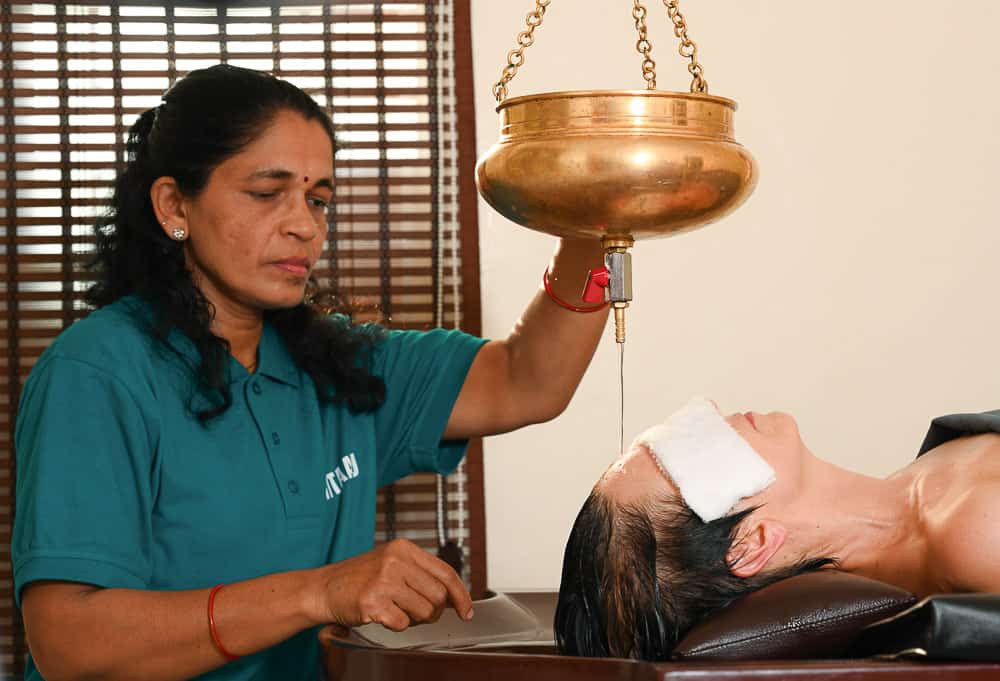
My Panchakarma Treatment Program
Below are the specifics of my Panchakarma program, which varies for each individual based on their unique conditions and constitution. This program involved intake of several natural medicines daily, along with a bland vegetarian diet, primarily consisting of kichiri (rice, vegetables, and moong dal cooked together).
- December 22: Day 1 – Abhyanga and Bashpa Sweda
- Day 2 – Abhyanga, Shirodhara, and Bashpa Sweda
- Day 3 – Sunday (day off)
- Day 4 – Shirodhara, Udwartana, and Bashpa Sweda
- Day 5 – Snehana: GTG 50ml at 8am (medicated ghee instead of breakfast); Abhyanga, Shirodhara, and Bashpa Sweda
- Day 6 – Snehana: GTG 50ml at 8am (medicated ghee instead of breakfast); Shirodhara, Udwartana, and Bashpa Sweda
- Day 7 – Snehana: GTG 50ml at 8am (medicated ghee instead of breakfast); Abhyanga, Shirodhara, and Bashpa Sweda
- Day 8 – Snehana: GTG 50ml at 8am (medicated ghee instead of breakfast); Shirodhara, Udwartana, and Bashpa Sweda
- Day 9 – Snehana: GTG 50ml at 8am (medicated ghee instead of breakfast); Abhyanga, Shirodhara, and Bashpa Sweda
- Day 10 – Sunday (day off)
- Day 11 – Abhyanga and Bashpa Sweda followed by Virechana (t leha grams). All-day fasting.
- Day 12 – No treatments, day off
- Day 13 – Abhyanga and Bashpa Sweda. Taili Basti. Facepack.
- Day 14 – Niruha Basti at 12:30. Taili Basti and Nasya Taili at 2:30
- Day 15 – Niruha Basti at 12:30. Taili Basti and Nasya Taili at 2:30
- Day 16 – Udwartana, Bashpa Sweda, and Niruha Basti at 10:30.
- Day 17 – Sunday (day off)
- Day 18 – Abhyanga and Bashpa Sweda. Niruha Basti at 11:30. Taili Basti and Nasya Taili at 2:30
- Day 19 – Abhyanga and Bashpa Sweda. Taili Basti and Nasya Taili at 2:30
- Day 20 – Recovery begins: recovery is a gradual process that can take a couple of weeks.
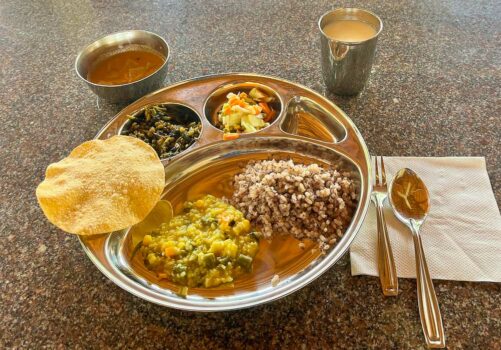
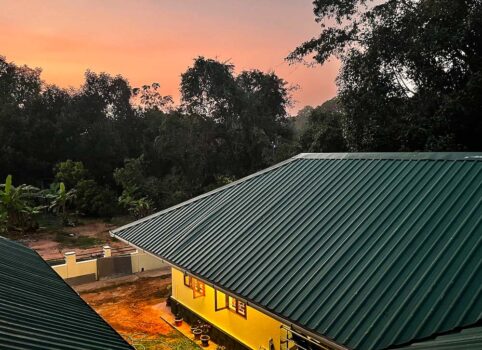
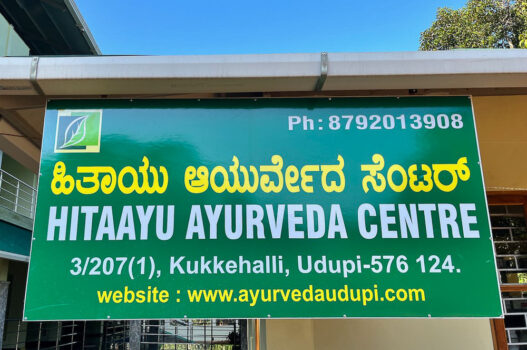
What is it Like to Undertake Panchakarma?
Completing a Panchakarma program requires dedication. While immensely rewarding, it can be quite challenging. The medicated ghee is unpalatable and may induce nausea. The day devoted to Virechana can be particularly tough, involving fasting and intensive purging. Additionally, the Basti treatments can be uncomfortable, and the natural medicines can taste unpleasant while the food typically consists of bland fare.
It’s important to be aware that as you release toxins from your body, you might also encounter emotional upheaval during the process—a potential emotional rollercoaster. Furthermore, once the treatments conclude, adhering to a careful diet and lifestyle is crucial for effective recovery and reintegration into everyday life.
Nonetheless, Panchakarma can significantly reset your approach to health, and if you follow the recommended dietary and lifestyle guidelines, it can lay the foundation for a very healthy life. I plan to return to Hitayu Ayurveda Udupi for this very reason!
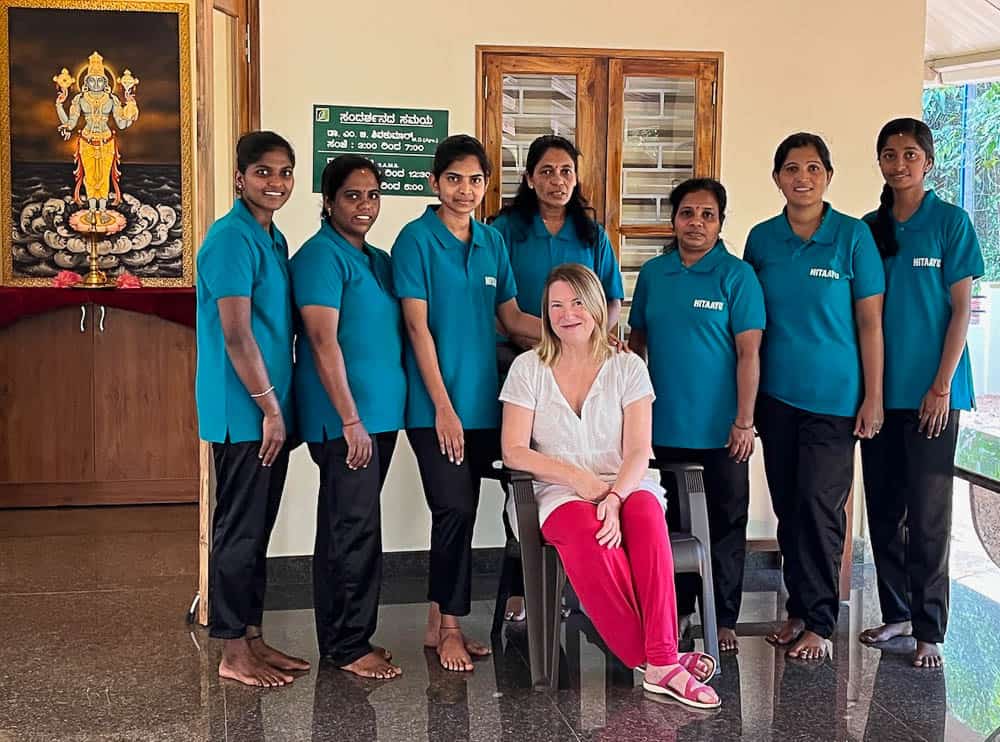
What to Pack for Panchakarma
The following items enhanced my experience during Panchakarma:
- A small thermos and reusable water bottle
- Flip flops
- Mild soap and an additional towel
- One to three light cotton dresses or robes
- Cotton buds
- Feminine hygiene products
- Toilet paper and tissues
- Laundry detergent or sheets
- Books for leisure reading
Contact Hitayu Ayurveda Udupi
Many thanks to Dr. Shivakumar, and my therapists Sunitha & Divya, Malati & Nikshita, Usha & Vismita, and to Madhusoodan & Sujata for the nourishing food and thoughtful personal touches (thanks for the daily ginger tea!).
To reach Hitayu Ayurveda Udupi, you can email: ayurvedaudupi@gmail.com
If you enjoyed this post, please.
Sign up for Dispatches in the sidebar, and follow Breathedreamgo across all social media channels, including Instagram, Facebook, Pinterest, and Twitter. Thank you!


